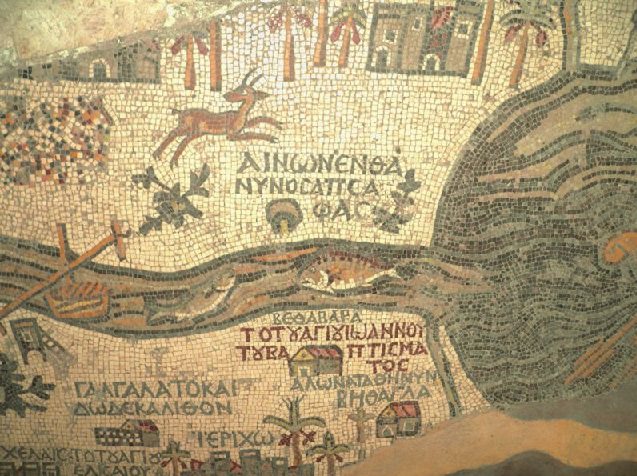God’s Word for You
Mark 1:3 baptism for the forgiveness of sins
by Pastor Timothy Smith on Monday, May 17, 2021
4 John appeared, baptizing in the wilderness and preaching a baptism of repentance for the forgiveness of sins. (EHV)
The location of John’s ministry is given in different ways:
- Preaching in the desert of Judea (Matthew 3:1)
- Baptizing in the wilderness (Mark 1:4)
- In the Jordan (Mark 1:9)
- All the country around the Jordan (Luke 3:2)
- Bethany/Bethabara on the other side of the Jordan (John 1:28)
- Also…at Aenon near Salim (John 3:23)
In the Bible, words like “desert” and “wilderness” often mean uninhabited more than what we think of as a place for sand dunes, cactus, and roadrunners. What these references tell us is that John baptized on both sides of the Jordan, but in the uninhabited places close to the river or its tributaries. Aenon seems to have been on the west bank, within sight of Mount Gilboa and just across the Jordan from the Brook Kerith where Elijah was fed by Ravens (1 Kings 17:3-6).
Bethabara (the “other Bethany”) has long been associated with the place near Jericho where the Israelites crossed over, led by Joshua (Joshua 3:15-16). Lt. William Lynch, the American naval officer who surveyed the Jordan in 1849, logged that Bethabara was “ten minutes” by boat north of the Wadi Faria (Narrative of the U.S. Expedition to the Jordan River and the Dead Sea, Chapter XI). An ancient Byzantine mosaic (floor tile) map shows Bethabara on the west side of the river. Note that in the map, “up” is east, not north, and the Dead Sea is the dark body to the right. The word “Jericho” (Iέριχω) can be seen at the bottom.

Baptism or washing was a common ritual purification in the Old Testament. Bathing with water was required to be ceremonially clean (Leviticus 14:8; Numbers 19:19). Even the high priest had to do this before putting on his garments (Leviticus 16:4), and so did the man who took the scapegoat out into the wilderness, before he could return to the community (Leviticus 16:28). God commanded John to use this washing for an even clearer purpose: the direct application of the gospel of the forgiveness of sins. Baptism is not a mere reminder or representation, but forgiveness directly and actually applied to the one being baptized. Peter stresses this point when he refers to the waters of Noah’s flood being the same waters that saved Noah and his family. That water symbolized baptism, “baptism that now saves you also—not the removal of dirt from the body but the pledge of a good conscience toward God. It saves you by the resurrection of Jesus Christ” (1 Peter 3:21).
Since your own baptism, you have been connected to Jesus through his baptism, and also through his death and resurrection. The result is that “we may live a new life” (Romans 6:4), a life that pleases God on account of Jesus and his obedience. Luther said, “The old Adam in us should be drowned by daily contrition and repentance, and all its evil deeds and desires should be put to death. A new person should daily arise to live before God in righteousness and purity forever” (Luther, Small Catechism).
Repentance means first being sorry for our sins, and second being lifted up by Jesus and his forgiveness and putting our faith in Jesus. Repentance without faith is nothing at all, nothing more than terror, and the damned have that in hell. What sets true repentance apart from that terror is our faith in Jesus and in his forgiveness. We give up our self-righteous opinions about our value and our good works. These things are nothing at all without Christ. Peter said: “We believe it is through the grace of our Lord Jesus that we are saved” (Acts 15:11). And Paul said: “God has saved us not because of anything we have done but because of his own purpose and grace” (2 Timothy 1:9).
Your baptism was done once to wash away your sins (Ephesians 4:5). Repentance continues because God in his mercy knows that “we daily sin much” (Luther’s explanation of the Fifth Petition) and that we will ask forgiveness even though it has already been given. So he gives us faith in Christ, and he strengthens that faith with his holy Word. We read in the Scriptures. We hear it preached in sermons. We consume it in the Lord’s Supper. And we were washed with it once in our baptism, for all our sins, our whole life through, forever.
In Christ,
Pastor Timothy Smith





